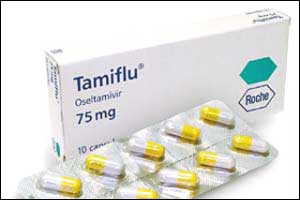- Home
- Editorial
- News
- Practice Guidelines
- Anesthesiology Guidelines
- Cancer Guidelines
- Cardiac Sciences Guidelines
- Critical Care Guidelines
- Dentistry Guidelines
- Dermatology Guidelines
- Diabetes and Endo Guidelines
- Diagnostics Guidelines
- ENT Guidelines
- Featured Practice Guidelines
- Gastroenterology Guidelines
- Geriatrics Guidelines
- Medicine Guidelines
- Nephrology Guidelines
- Neurosciences Guidelines
- Obs and Gynae Guidelines
- Ophthalmology Guidelines
- Orthopaedics Guidelines
- Paediatrics Guidelines
- Psychiatry Guidelines
- Pulmonology Guidelines
- Radiology Guidelines
- Surgery Guidelines
- Urology Guidelines
MYTH BUSTER- Tamiflu not associated with increased risk of suicide in children

The U.S. Food and Drug Administration originally approved Tamiflu in 1999 but subsequent case reports of abnormal behavior in adolescents who used the medication led it to include a warning label about potential neuropsychiatric side effects in the packaging of the drug in 2006.However, various studies examining the association between the use of Tamiflu and neuropsychiatric side effects in children, including suicide, had been inconclusive.To fill this gap, Dr.Antoon and his colleagues in the UIC College of Pharmacy retrospectively studied the association between the use of Tamiflu and suicide.The researchers have found that the drug oseltamivir (Tamiflu ) does not cause an increased risk of suicide in pediatric patients.
"When the FDA puts a warning out about a drug, doctors and the public take notice," said corresponding author Dr. James Antoon, assistant professor of clinical pediatrics in the UIC College of Medicine. "While the warnings are necessary, they are often not based on conclusive clinical data, which can make it difficult for physicians to truly know the potential side effects of a drug as they evaluate its possible benefits for individual patients."
"The potential link between a drug and suicide is a particularly difficult topic to study," Antoon said. "Many events, which can happen simultaneously or over time, can influence a person to attempt suicide, as can an illness itself -- so it can be difficult to study scientifically.
"That's why we used a novel method called a case-crossover design," Antoon said. "This analysis is different because it allowed us to use each individual subject as his or her own comparison -- we retrospectively studied how patients behaved when on Tamiflu and compared it to their behavior when they were not taking the drug."
The researchers identified 21,047 children between the ages of 1 and 18 who attempted suicide during five recent flu seasons (2009-2013) from a national administrative claims database. Of this group, 251 of those children were exposed to Tamiflu, which was determined based on outpatient pharmacy dispensing data. The mean age of this group was 15 years, 61 percent were female, and 65 percent had an underlying mental health diagnosis.
"For each of the 251 patients, we assigned the 10-day period immediately before the suicide attempt as the case period and we identified up to four earlier control periods of the same length, in the same flu season," Antoon said. "This helped us to account for within-person confounders, like depression, mental health, trauma and abuse, and other factors, like race or ethnicity."
The researchers repeated the analysis with flu diagnosis alone, without the use of Tamiflu, to see if the infection itself could have been a confounding factor associated with suicide risk."We did not find any association between exposure to Tamiflu and suicide in pediatric patients," Antoon said.
While Antoon believes the findings, which are published in the Annals of Family Medicine, will help to alleviate some fears health care providers may have about prescribing the medication in healthy children, he says doctors will likely continue to prescribe Tamiflu with caution.
"I think physicians will welcome a large, rigorous study on this topic and factor this information into their decision-making process," he said. "While this study addresses suicide, there are still many other questions about other possible neuropsychiatric side effects of the drug, which we plan to study in the future. There are also other reasons to use caution when prescribing the drug, including resistance and efficacy in children."
Using this novel study design, which reduced statistical concerns found in previous studies, researchers did not find an association between oseltamivir or influenza diagnosis (only) and suicide.
For more details click on the link : doi: 10.1370/afm.2183

Disclaimer: This site is primarily intended for healthcare professionals. Any content/information on this website does not replace the advice of medical and/or health professionals and should not be construed as medical/diagnostic advice/endorsement or prescription. Use of this site is subject to our terms of use, privacy policy, advertisement policy. © 2020 Minerva Medical Treatment Pvt Ltd